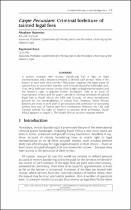| dc.contributor.author | Hamman, Abraham | |
| dc.contributor.author | Koen, Raymond | |
| dc.date.accessioned | 2022-05-12T09:03:06Z | |
| dc.date.available | 2022-05-12T09:03:06Z | |
| dc.date.issued | 2020 | |
| dc.identifier.citation | Hamman, A., & Koen, R. (2020). Carpe Pecuniam: Criminal forfeiture of tainted legal fees. De Jure Law Journal, 53(1), 19-35. https://dx.doi.org/10.17159/2225-7160/2020/v53a2 | en_US |
| dc.identifier.issn | 2225-7160 | |
| dc.identifier.uri | http://dx.doi.org/10.17159/2225-7160/2020/v53a2 | |
| dc.identifier.uri | http://hdl.handle.net/10566/7386 | |
| dc.description.abstract | A person charged with money laundering has a right to legal
representation and a lawyer is entitled to defend such person. What if the
lawyer is paid with dirty money? This paper explores the legal status of
tainted fees, to determine whether such moneys should be forfeitable and,
if so, what forfeiture means for the client’s right to legal representation and
the lawyer’s right to practise his\her profession. This is an issue of
international import and the paper considers criminal forfeiture of tainted
legal fees in South Africa, the USA and Canada. All three jurisdictions
provide for the criminalisation of tainted fees. However, South African
lawyers are most in peril both of prosecution and conviction for accepting
tainted fees and of having such fees confiscated. Whereas the USA and
Canada uphold the right of lawyers to practise their profession, South
Africa appears to negate it. The South African position requires reform. | en_US |
| dc.language.iso | en | en_US |
| dc.publisher | Pretoria University Law Press | en_US |
| dc.subject | Criminal law | en_US |
| dc.subject | Money laundering | en_US |
| dc.subject | Client’s right | en_US |
| dc.subject | Lawyer’s right | en_US |
| dc.subject | Criminal forfeiture | en_US |
| dc.subject | South Africa | en_US |
| dc.title | Carpe Pecuniam: Criminal forfeiture of tainted legal fees | en_US |
| dc.type | Article | en_US |

